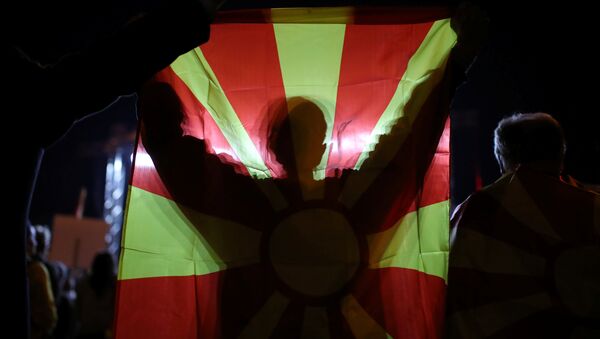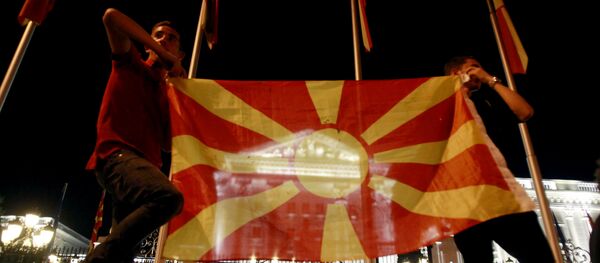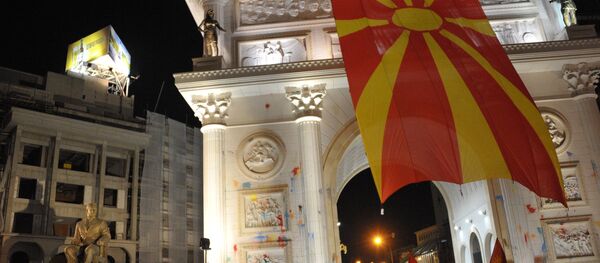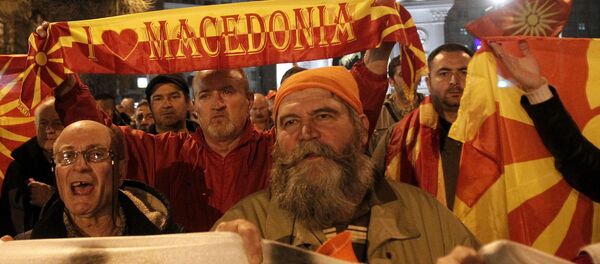Macedonia's renaming will open the door to NATO for the country and allow the alliance to form a united anti-Russian front in the Balkans, says Konstantin Sivkov, a military specialist and member of the Russian Academy of Sciences.
Three Reasons Why NATO Wants to Absorb Macedonia
"The NATO leadership is digging its heels in and creating a 'fence' along our western borders," Sivkov told Sputnik. "Last year, Montenegro, another Balkan state, was admitted [to NATO]. Thus, the alliance severed Serbia, a potential ally of Russia, from the Adriatic Sea. Macedonia is a landlocked country that borders NATO members — Greece, Bulgaria, and Albania. That is, the alliance forms a united front."
The military specialist did not rule out that NATO may use Macedonia as a foothold in case the US withdraws from the Intermediate-Range Nuclear Forces (INF) Treaty.
"[Macedonia] is well suited for the deployment of American missiles as the flight time to major Russian cities from the country is very small. Perhaps, elements of a global US missile defense will be deployed there," he presumed.
"NATO is taking over Europe in the interests of the United States," the scholar said. "There is no doubt that this processes will continue with regard to other countries. Ukraine is the next in line."
On the other hand, Sputnik military observer Andrei Kots believes that Western arms producers are planning to capitalize on the modernization of the Macedonian Armed Forces.
"[Macedonia's] armament, mostly of Soviet-Russian production, will have to be replaced with Western weapons," the observer noted in his op-ed. "However, some of this has already been done: the Macedonian military has long been using Western rifles — American M4 and M240 machine guns, German Heckler & Koch MP5 submachine guns, and Czech CZ 75 semi-automatic pistols."
Currently, the country's ground forces largely rely on 31 T-72 tanks, Soviet-era BMP-2 amphibious infantry fighting vehicles, MT-LB amphibious armored tracked vehicles, BTR-70 and BTR-80 amphibious armored personnel carriers (APC), Kots elaborated. In addition, he continued, Macedonia had purchased over 100 TM-170 Hermelin armored personnel carriers from Germany, 10 ELVO Leonidas-2 armored vehicles from Greece and about three dozen outdated M113 APCs from the US.
The country's artillery comprises Soviet-made BM-21 "Grad" multiple rocket launchers, M-30 howitzers, and American M2A1 cannons, Kots remarked, adding that Macedonia's air force is represented mostly by helicopters, including six Mil Mi-24s acquired from Ukraine and modernized by the Israeli firm Elbit. According to the military observer, the Macedonian Army also possesses six Mi-17s and several US-made Bell UH-1 Iroquois.
The country's military budget for 2018 is estimated at 6.4 billion Macedonian denars ($123.3 million), which is comparable with that of its neighbor, Albania ($169.4 million).
Kots remarked that it remained unclear whether the country's military would find resources to upgrade Macedonia's outdated vehicle park in case of its admission to NATO.
It's All About Name
Macedonia's name change referendum was held on September 30. Although the majority of those voting endorsed the change, just 36 percent of eligible voters took part in the plebiscite, with 50 percent needed.
On October 1, NATO issued an official statement saying that "in yesterday's consultative referendum, an overwhelming majority of those voting supported that path," adding that "it is now in the hands of politicians in Skopje to decide on the way forward."
For its part, the US State Department welcomed the vote, highlighting that Macedonia's name change would allow the country "to take its place in NATO and the EU, contributing to regional stability, security, and prosperity."
The U.S. welcomes the results of the Republic of #Macedonia’s Sept 30 referendum. We strongly support the Agreement’s full implementation, allowing Macedonia to take its place in @NATO and the EU, contributing to regional stability, security, & prosperity. https://t.co/FaBKpi7JaF pic.twitter.com/N9Ik6FyosI
— Heather Nauert (@statedeptspox) September 30, 2018
However, some Western mainstream media have expressed skepticism over the vote, with The Washington Post saying that the low turnout of Macedonia's plebiscite has "made things awkward for the West."
"The low turnout was seen as a blow not only to the efforts of the 'Yes' camp but also its vociferous backers in Brussels, Berlin, and Washington," the media outlet opined.
For its part, The Economist presumed that instead of sorting things out, Macedonian voters "have opened the door to instability and uncertainty."
The views of the contributors do not necessarily reflect those of Sputnik.





